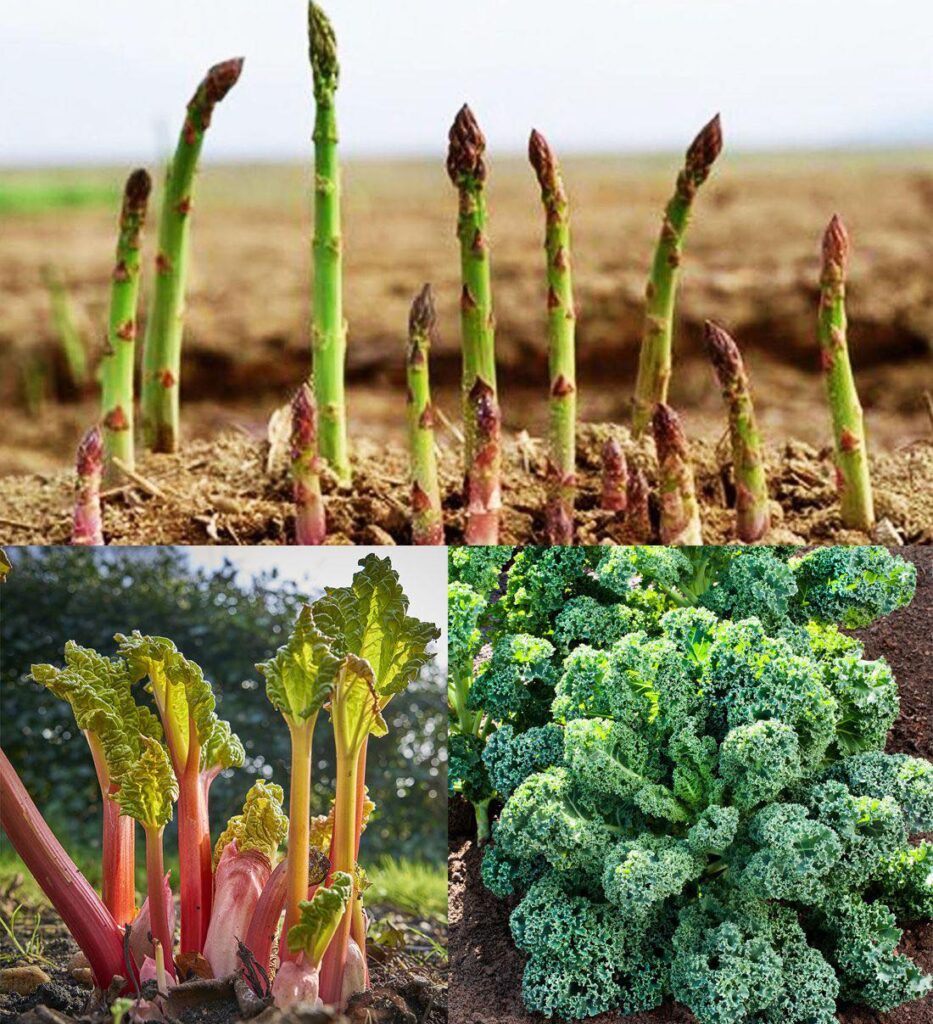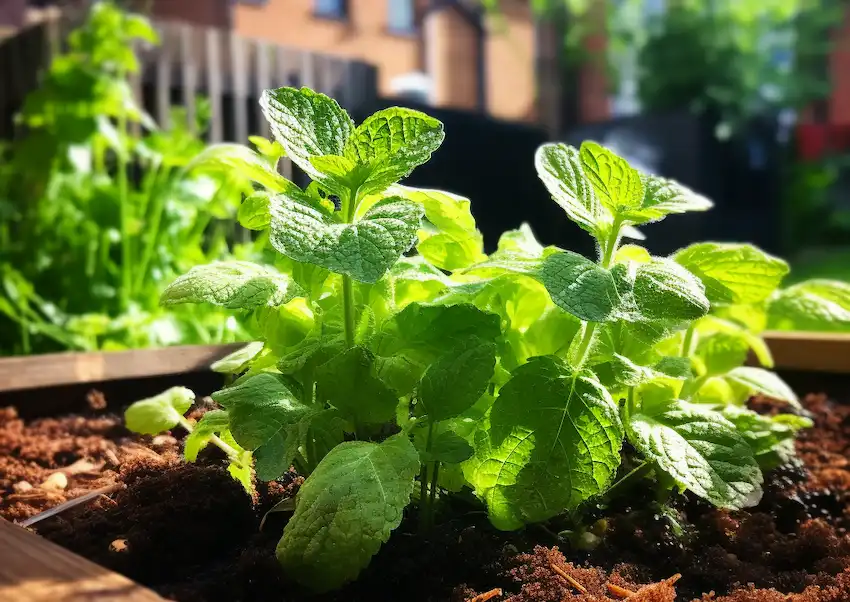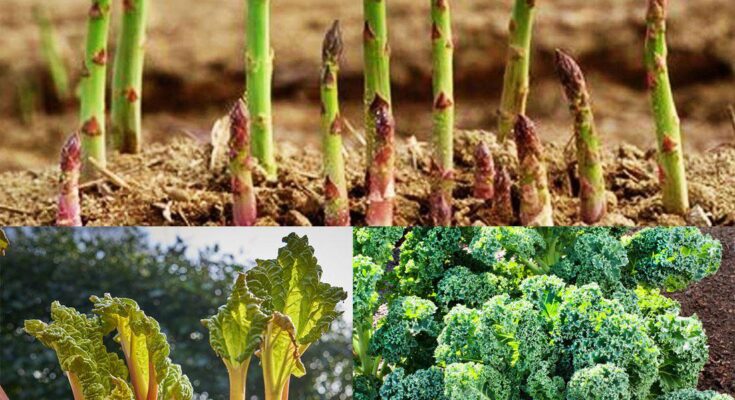Cultivating a garden that provides a yearly bounty with minimal replanting is a dream for many gardeners. Perennial food plants are the cornerstone of such a garden, offering a sustainable and low-maintenance approach to homegrown produce. Unlike annuals, these plants don’t need to be replanted each year, making them an efficient and eco-friendly choice for your garden. This article delves into ten incredible perennial edibles that will grace your table year after year, along with tips for planting, caring, and harvesting.

1. Asparagus (Asparagus officinalis):

- Characteristics: Spears rise early in spring, followed by feathery fern-like foliage.
- Planting Guide: Plant crowns in early spring in well-drained soil. Asparagus prefers full sun but can tolerate partial shade.
- Care Tips: Water regularly and mulch to retain moisture. Allow the plants to establish for a few years before heavy harvesting.
2. Rhubarb (Rheum rhabarbarum):
- Characteristics: Known for its tart, red stalks and large green leaves.
- Planting Guide: Plant rhubarb crowns in early spring in fertile, well-drained soil. Choose a sunny or lightly shaded spot.
- Care Tips: Water consistently during dry periods. Harvest stalks by twisting and pulling from the base. Leave at least two-thirds of the stalks on the plant to ensure vigor.
3. Jerusalem Artichoke (Helianthus tuberosus):
- Characteristics: Produces edible tubers and tall, sunflower-like blooms.
- Planting Guide: Plant tubers in early spring in well-drained soil. Full sun is preferred.
- Care Tips: Water regularly and watch for the tall stalks to die back in the fall. Harvest tubers after the first frost for the best flavor.
4. Chives (Allium schoenoprasum):
- Characteristics: Hardy herbs with mild onion flavor. Edible flowers bloom in late spring.
- Planting Guide: Plant in early spring or fall. Chives grow well in full sun or partial shade and prefer moist, well-drained soil.
- Care Tips: Water regularly and cut back to the ground in winter. Divide clumps every 3-4 years to maintain vigor.
5. Mint (Mentha spp.):

- Characteristics: Aromatic herb with a variety of culinary uses. Spreads vigorously.
- Planting Guide: Plant in spring in a contained area or pot, as mint can be invasive. Prefers partial shade and moist, well-drained soil.
- Care Tips: Water consistently and cut back before winter. Harvest leaves before the plant flowers for the best flavor.
6. Oregano (Origanum vulgare):
- Characteristics: Hardy herb with a strong, zesty flavor. Small, white flowers bloom in summer.
- Planting Guide: Plant in well-drained soil in a sunny spot. Can be planted in spring or fall.
- Care Tips: Water regularly but be careful not to overwater. Harvest leaves as needed, preferably before the plant flowers.
7. Sorrel (Rumex acetosa):
- Characteristics: Leafy green with a tangy, lemon-like flavor. Best harvested young.
- Planting Guide: Plant in early spring in moist, well-drained soil. Prefers full sun to partial shade.
- Care Tips: Water regularly and remove flowers to encourage leaf production. Harvest leaves from the outside, allowing the center to continue growing.
8. Kale (Brassica oleracea):
- Characteristics: Leafy green with high nutritional value. More flavorful after frost.
- Planting Guide: Plant in well-drained soil rich in organic matter. Prefers full sun but tolerates partial shade.
- Care Tips: Water consistently and mulch to retain moisture. Harvest outer leaves, allowing the center to continue producing.
9. Globe Artichokes (Cynara cardunculus var. scolymus):
- Characteristics: Known for their large, edible flower buds. Striking architectural plant.
- Planting Guide: Plant crowns or rooted suckers in spring in well-drained soil. Full sun is essential.
- Care Tips: Water deeply and regularly. Harvest buds when they are tight and before they open.
10. Blueberries (Vaccinium spp.):

- Characteristics: Produces sweet and nutritious berries. Requires acidic soil.
- Planting Guide: Plant in early spring or fall. Choose a sunny spot with well-drained, acidic soil.
- Care Tips: Water regularly and mulch with acidic material like pine needles. Prune bushes in late winter to encourage fruit production.
Incorporating perennial edibles into your garden is a wise choice for sustainable, low-maintenance gardening. These ten plants offer a delightful array of flavors and textures, enriching your meals and your gardening experience. With proper care and a little patience, you’ll enjoy the fruits of your labor year after year, savoring the continuity and abundance that only perennials can provide. Embrace these perennial favorites and watch your garden and your table come to life with each returning season.
Inspired by this? Share the article with your friends!



